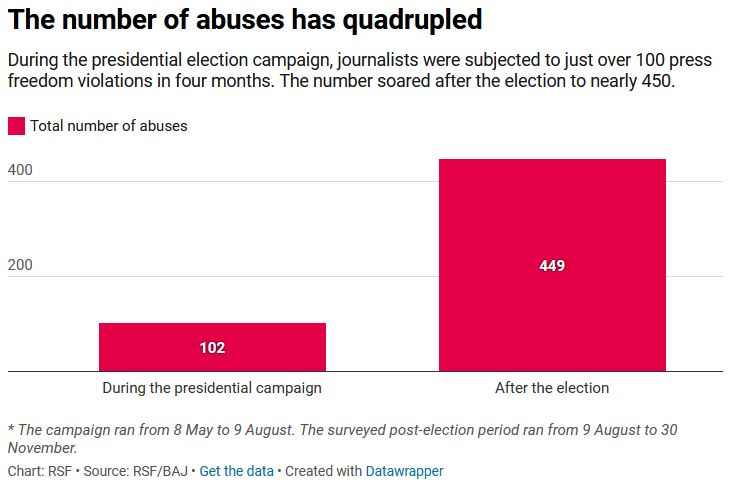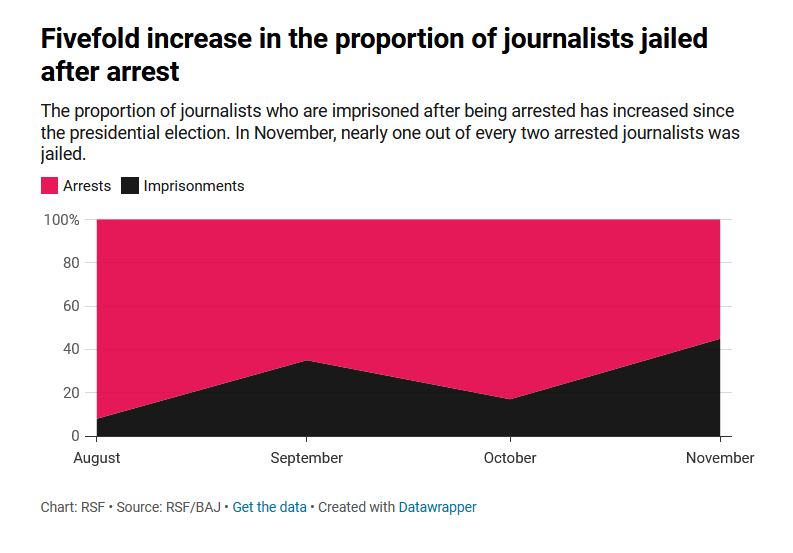RSF’s 15 recommendations for ending the four-month-old crackdown on press freedom in Belarus
After nearly 450 press freedom violations registered in Belarus in the past four months, Reporters Without Borders (RSF) is recommending 15 ways to end what is an unprecedented crackdown on the media in a European country.
Belarus has confirmed its status as Europe’s most dangerous country for journalists. Around 370 have been arrested since 9 August just for doing their job and eight are still being held. As the data gathered by RSF and its local partner, the Belarusian Association of Journalists (BAJ), shows, the police deliberately use violence against reporters covering demonstrations with the clear aim of gagging the media and making the protests “disappear.”

449 VIOLATIONS
Press freedom violations have been registered since the start of the Belarusian presidential election campaign on 8 May, but the number has soared since the day after the election, held on 9 August. Violations have quadrupled in the past four months. The authorities have imposed an increasingly hostile climate in which they have not only arrested many journalists arbitrarily, but also carried out searches, withdrawn accreditations massively, censored and disconnected the Internet, and hampered the printing and distribution of newspapers.
368 ARRESTS
Of nearly 370 arrests of journalists between 9 August and 30 November, around 80 have resulted in a prison sentence. The authorities deny journalists the right to cover the events that have shaken the country for the past four months. In almost all the prosecutions, the journalists have been accused of “participating in an illegal demonstration” or “disobeying the police” in an unfair trial with often anonymous or absent prosecution “witnesses.”

1/2 ARRESTED JOURNALISTS IS CONVICTED
Arrests have led with increasing frequency to conviction and imprisonment. More than a third of all cases of journalists being jailed took place in November. In August, fewer than 10% of arrested journalists were jailed, but the proportion has increased to nearly one out of every two journalists arrested in November.
Even longer sentences
The length of time that journalists are detained in Belarus has grown steadily since the presidential election. Sentences keep on getting harsher. In August, a journalist was sentenced to an average of five days in prison. Now the average is 13 days. In another sign of a much more draconian policy, at least seven journalists have been subjected to criminal prosecutions (or under investigation and threatened with such prosecutions) involving the possibility of sentences of several years in prison.
62 CASES OF TORTURE AND MISTREATMENT
At least 62 journalists have been victims of violence, mistreatment or even torture while detained, according to the BAJ. They include Ruslan Kulevich of Hrodna.life, who was violently arrested in the western city of Hrodna on 11 August and was threatened with being killed although he was wearing a “press” vest. When released two days later, he was hospitalized with fractures to both forearms and concussion caused by the blows he received while held, and he was denied food and medical attention. Despite clear evidence of violence, no investigation was carried out and no one was punished. Police and prison guards act with complete impunity in Hrodna, as elsewhere in Belarus.
Recommendations for ending the repression
In order to end the crackdown and establish new bases for press freedom in Belarus, RSF is addressing 15 recommendations to the Belarusian authorities and international bodies. They include a request to the European Union to freeze all financial assistance to Belarus for as long as it continues to flout human rights.
For the authorities in Belarus:
1. In accordance with the recommendations on freedom of expression and freedom of the media that the OSCE rapporteur issued on 5 November under the Moscow Mechanism, RSF recommends that the Belarusian authorities should:
-
Provide journalists and media with a safe and hospitable environment;
-
Guarantee the safety of all journalists and refrain from any persecution linked to their work or any form of obstruction, including seizing and damaging their equipment;
-
Prosecute persons accused of press freedom violations in accordance with international standards;
-
Enable an independent body to quickly investigate all allegations of torture, mistreatment, sexual assault or enforced disappearance;
-
Facilitate accreditation for foreign journalists;
-
Refrain from any interference of Internet access, including mobile Internet, and end the censorship and blocking of news websites and any restriction on bloggers;
-
End the information ministry’s prosecution of the TUT.by news website aimed at no longer recognizing its mass media status, and unblock the 70 websites that are currently inaccessible;
-
Allow independent print media to access printing and distribution services;
-
Stop requiring all media to keep records and to reveal to the authorities the names of persons who post comments;
2. Drop criminal prosecutions and administrative proceedings against journalists who have just been doing their job, and review criminal and administrative decisions already taken against journalists who were just doing their job;
3. Facilitate visits to Belarus by the OSCE Rapporteur and United Nations independent experts and facilitate the UN Human Rights Council’s special procedures;
4. Engage in the Council of Europe accession process in which Belarus would undertake to comply with obligations under the European Convention on Human Rights and therefore accept the jurisdiction of the European Court of Human Rights. Belarus could thereby benefit from the technical assistance that the Venice Commission provides on democracy and the rule of law.
For European institutions and EU Member States:
5. Offer and increase assistance to threatened journalists and media workers, such as a safe passage through their countries, refuge and medical assistance if necessary.
— European Commission and Council:
6. Freeze any financial assistance for Belarus under the European Neighbourhood Instrument* for as long as the common values and universal fundamental values of the rule of law and human rights are not respected.
* (except assistance for the promotion of human rights and fundamental freedoms by civil society organizations and non-state actors)
- Council of the EU:
7. Continue efforts to impose economic sanctions and other restrictive measures on persons or entities involved in or supporting violations of international electoral standards and international human rights law, especially violations of freedom of expression and media freedom.
8. Suspend all or part of EU funding in the event of a serious or persistent deterioration in democracy, human rights or the rule of law in Belarus. To this end, speed up adoption of the Regulation of the European Parliament and Council offering this possibility to the Commission under its neighbourhood policy.
For the Council of Europe:
9. Include the promotion and improvement of press freedom, freedom of expression and pluralism, which have so far been completely absent from the 2019–2021 Action Plan for Belarus, making them one of the priority goals and projects of any further action plans and allocating them the necessary resources.
For the OSCE:
10. Systematically condemn attacks, intimidation and censorship of journalists and media in Belarus and demand independent and impartial investigations when such violations take place;
11. Firmly and actively request implementation of the recommendations on freedom of expression and freedom of the media that the OSCE rapporteur addressed to the Belarusian authorities;
12. Create a tool for monitoring measures taken by the Belarusian authorities to establish human rights, democracy and the rule of law.
For the UN:
13. Systematically condemn attacks, intimidation and censorship of journalists and media in Belarus and demand independent and impartial investigations when such violations take place;
14. Work with the Belarusian authorities to facilitate the involvement of UN special procedures in the protection and promotion of human rights in Belarus, especially the procedure of the special rapporteur for freedom of expression;
15. Work with the Belarusian authorities so that the UN High Commissioner for Human Rights can quickly establish a permanent bureau to provide concrete assistance with changing human rights practices, with special attention to improving freedom of expression, pluralism and media freedom.
Ruled since 1994 by Alexander Lukashenko, who has managed to be reelected as president in the first round every five years, Belarus is ranked 153rd out of 180 countries in RSF’s 2020 World Press Freedom Index.
 @bajmedia
@bajmedia
